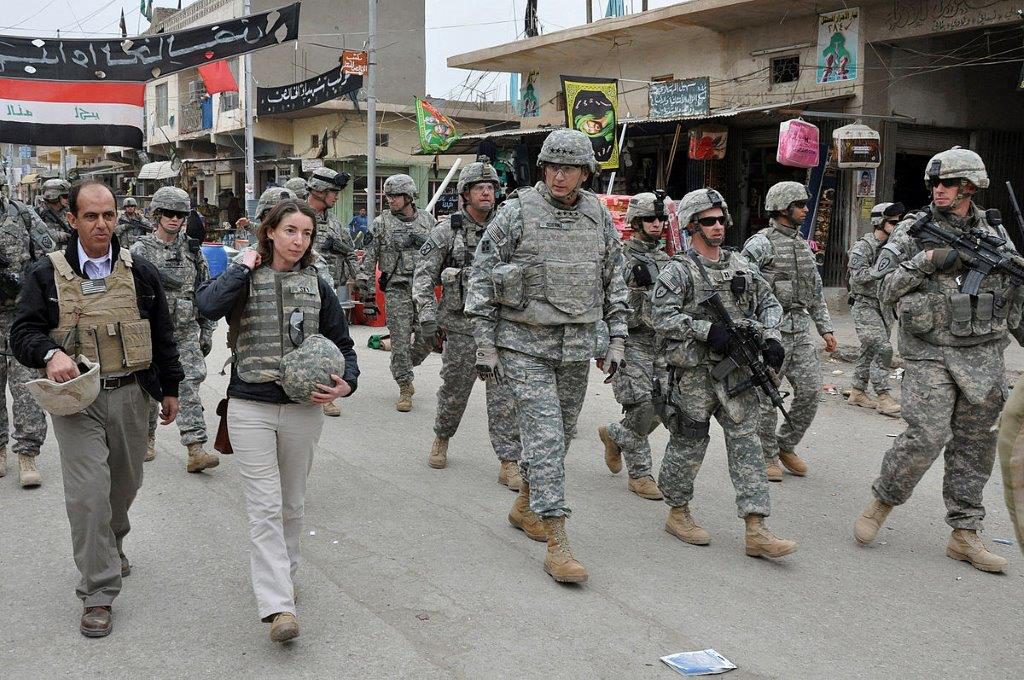
Welcome to The Strategist Six, a feature that provides a glimpse into the thinking of prominent academics, government officials, military officers, reporters and interesting individuals from around the world.
1. You commented recently that Palestinian disenfranchisement led to decades of terrorism and ‘that is nothing to what is going to happen now’. Given your deep immersion in the Middle Eastern situation, what’s likely to happen now?
In the 1990s, the Middle East peace process aimed to ensure that, within a decade, nobody would consider themselves a refugee. Since then, the number of refugees in the region has increased exponentially, with millions of Iraqis and Syrians displaced by international intervention and civil war.
The consequences of the dispossession of the Palestinians and the failure to resolve the conflict should serve as a warning to the international community. It led to neighbouring countries being destabilised and to acts of terrorism. The ongoing civil wars in the Middle East have created chaos and ungoverned space in which groups such as ISIS emerged. The conflict has brought misery to millions, radicalising some and forcing others to flee. Many suffer trauma and depression from losing family, friends and possessions. The consequences will be felt for generations.
There are likely to be reprisal killings and revenge attacks against those perceived to have collaborated with ISIS—or the regime. Some will return to their homes once the fighting is over. Many, however, will try to rebuild their lives outside their home country. It will take decades to rebuild the social fabric and to reintegrate former fighters back into society.
2. What role did President Trump’s visit to Saudi Arabia play in that country’s aggressive actions, days later, towards Qatar?
Trump’s visit to Riyadh appears to have emboldened Saudi Arabia. The Saudis seem to be using the perceived support of Trump to deflect attention away from their own contribution to regional instability by blaming Iran, and Qatar, for terrorism. The Sunni countries are unable to develop a united front against Iran and to push back on its regional projection of power because they’re divided among themselves. They have different interpretations of the role of Islam in society and politics.
The Saudi monarchy pursues top–down, hard-line Wahhabism and has used its oil wealth to spread Wahhabism abroad. Qatar, which is also Wahhabi, supports bottom–up populist Islam as represented by the Muslim Brotherhood. Saudi Arabia and Qatar both oppose Assad but support different opposition groups. ISIS, while having a Wahhabi interpretation of Islam, condemns Saudi Arabia for its relationship with the US. The Saudi-led boycott demands that Qatar respond to demands which include cutting relations with Iran, stopping support for the Brotherhood, and closing Al Jazeera. Iran and Turkey have come to Qatar’s defence.
3. How will Iran’s involvement in the fighting in Iraq and Syria change its position and its influence?
Iran is the main beneficiary of the Iraq war. The war, and the way the US departed Iraq, changed the balance of power in the region in Iran’s favour. Iran has taken advantage of the weakness of Iraq to project its influence through its relations with government officials, its cultivation of militias and religious tourism.
Iran responded quickly to the Iraqi government’s call for help when ISIS took over a third of that country. Iran has provided military support, along with Russia, to an embattled Assad, helping to change the battlefield in Syria in his favour and ensuring his continued rule. Shia militias, often supported by Iran, have been fighting in both Syria and Iraq, and have back-filled territory cleared of ISIS. The weakness of the Arab states has enabled Iran to project its power. They have lost out to Iran in both Iraq and Syria. Russia and Iran have been negotiating with Syrian rebels in Kazakhstan. Turkey and Qatar have been included in those talks, but Saudi Arabia and the Emirates have not.
4. Kurdish groups are playing a major role in recapturing significant areas of Iraq and Syria. Is that likely to lead to the creation of a Kurdish state, and if so where would it be? What would be the likely reaction of, for instance, Turkey?
Kurdish groups involved in the fight against ISIS have received weapons directly from Western countries and have expanded the territory they control. In Iraq, President Barzani is seeking to capitalise on that position by calling for a referendum on Kurdish independence, including in disputed territories such as Kirkuk. Barzani believes the move will strengthen the Kurdish negotiating position with Baghdad. But the border between Iraqi Kurdistan and Iraq is not agreed—and no government in Baghdad would give up Kirkuk. While the referendum might reveal strong Kurdish support for the independence of Iraqi Kurdistan, it doesn’t have support in the region or internationally. Iran and Turkey fear that the independence of Iraqi Kurdistan would spur separatist Kurdish movements in their own countries. Turkey is also concerned that the PYD, the Kurdish Syrian group, is carving out territory on Turkey’s southern border that it fears will become a launching pad for attacks into Turkey.
5. The recapture of Mosul and Raqqa will clearly be significant blows for the Islamic State’s plans to create a caliphate, but that won’t be the end of the story. What happens next?
The current iteration of ISIS will soon be destroyed. The challenge will be to develop legitimate and capable local governance to provide transitional justice, strengthen communities and take them forward together. The situation is made all the more complex given the relations between those towns and the central government, which is perceived as corrupt, sectarian and aligned with Iran. If the root causes and grievances that led to the rise of ISIS are not addressed, the conditions will be set for son-of-ISIS to emerge.
6. What do you think is the biggest threat to global security?
The main threat to world peace comes from the confluence of climate change and demographic bulge—and that’s felt perhaps the most acutely in the Muslim world.

